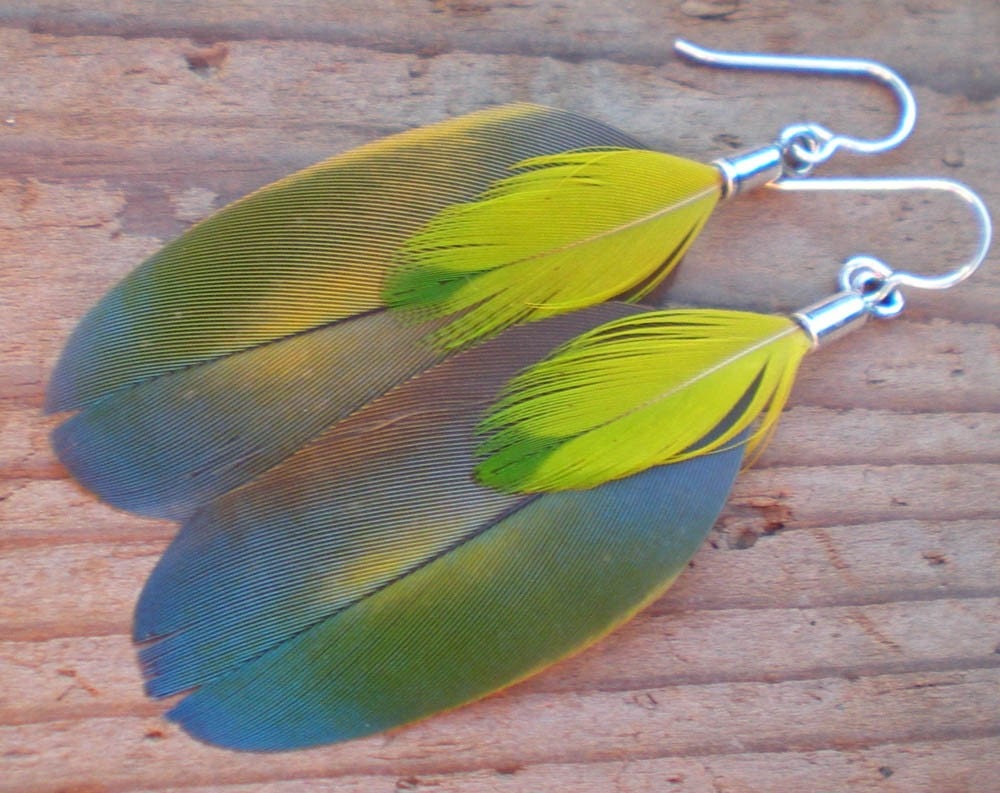
So I've been loving the beautiful feather earrings I've been seeing a lot lately, but I was concerned about getting any; after all, how would I know that the feathers came from a cruelty-free source? I decided to check one of my favorite jewelry shopping sites, Etsy.com, and found some gorgeous feather earrings by an artist named Heather (her shop is Smoobage's shop). I emailed her to see if she knew whether or not the feathers she used were indeed vegan.
Not only did she reply quickly and honestly, saying that she wasn't sure where the main source of her feathers got them, but she went to the trouble of ordering some gathered, moulted feathers and made a whole line of vegan earrings! She gave me first dibs on a pair that I fell in love with (although it was very hard to decide, as they were all so beautiful), but there are many others to choose from (the ones pictured above are available here). Once again, I am amazed by the willingness of others to cater to my strict ethical code. Who says style can't be compassionate?


6 comments:
Homie, I'm sorry but just because they're molted *does not* make them vegan for me. They come from an animal, and people wearing them will see how cute you are and go buy unethical feather jewelry.
Also, why does she have these captive birds? That's not vegan, either, to have birds in captivity. So, yes, even if they are fallen feathers...Fallen from what source...a captive bird?
There are birds that are domestic, like ducks, and they are no longer suited to survive in the wild. It would be a waste to not use their molted feathers to create something that can then go back to pay the bills at a duck sanctuary for ducks who are never abused or eaten, and who receive good veterinary care--including rescued ducklings left over from the Easter holiday. It is up to the consumers to make a conscious effort to find cruelty-free feather earrings, just like it is up to them to find out the contents of what they are eating. If we have to not wear or utilize a cruelty-free product, as molted feathers are in their natural state, because of the behaviors of humans, I don't think it will make much difference. The treatment of animals is dependent on education, most of which is the self-education and conscientious choices made by consumers. It's important that people have choices, because they will make them anyway--and, frankly, the more banned, rare, or outlawed an item is, the more people will poach for it.
Here's to alternatives!
Sheep need to be shorn - does that mean that vegans should wear wool? Chickens lay eggs naturally, so it makes sense to eat them, right? I agree with the first poster: this is not a vegan alternative. Using an animal for or as any sort of personal financial gain, even if the processes behind it are natural, is against the principles of veganism.
I had the same concerns about the fetaher trend even though I was finding my feathers naturally. So, I created an entire line of feather inspired VEGAN jewelry at http://Tlala.etsy.com
Interesting to see the comments left on these even years later... Ultimately one of the reasons I stopped updating this blog is because of the flak I get from fellow vegans. To me, wearing cruelty-free feathers is a conversation starter. Someone compliments them and I say, they're also cruelty-free and it opens up a conversation about animal rights and the little choices we can make that make a difference. I am not perfect; we all do what we can. Ever driven a car? Most car tires contain animal ingredients. I do the best I can, and I think it's ironic when others with basically the same belief system as me, point a blaming finger. I do appreciate the opinions of others but why not focus on educating someone who's eating a burger? If we make vegan lifestyles out to be some impossible form of perfection, people will believe it's impossible for them to follow. If we make it more friendly and accessible, people will be more open to making compassionate choices.
Post a Comment